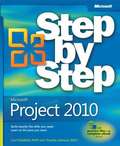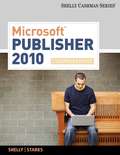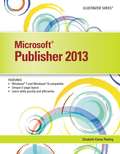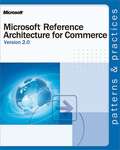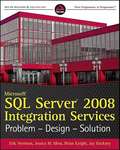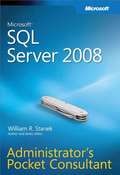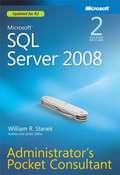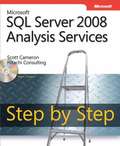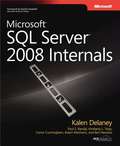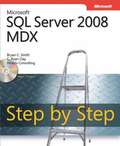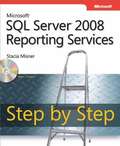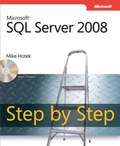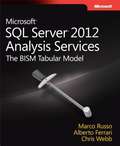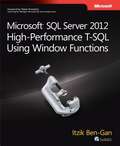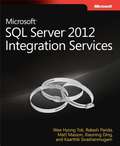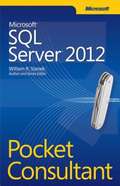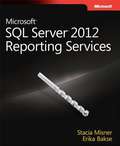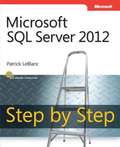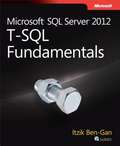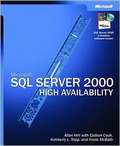- Table View
- List View
Microsoft® Project 2010 Step by Step
by Carl Chatfield Timothy JohnsonExperience learning made easy-and quickly teach yourself how to manage your projects with Project 2010. With Step By Step, you set the pace-building and practicing the skills you need, just when you need them! Topics include building a project plan and fine-tuning the details; scheduling tasks, assigning resources, and managing dependencies; monitoring progress and costs; keeping projects on track; communicating project data through Gantt charts and other views.
Microsoft® Publisher 2010, Comprehensive
by Gary B. Shelly Joy L. StarksMicrosoft Publisher 2010: Comprehensive provides a project-based, step-by-step approach to teaching Publisher 2010.
Microsoft® Publisher 2013: Illustrated
by Elizabeth Eisner RedingPraised by instructors for its concise, focused approach and user-friendly format, the Illustrated Series engages both computer rookies and hot shots in mastering Microsoft Publisher 2013 quickly and efficiently. Skills are accessible and easy-to-follow thanks to the Illustrated Series' hallmark 2-page layout, which allows students to see an entire task in one view. New Learning Outcomes outline the skills covered in each lesson, and larger full-color screens represent exactly what students should see on their own computers. Each unit begins with a brief overview of the principles of the lesson, and introduces a case study for further application.
Microsoft® Reference Architecture for Commerce Version 2.0
by Microsoft CorporationThe Microsoft Reference Architecture for Commerce, Version 2.0 consists of code and documentation designed to accelerate the development of e-commerce solutions for medium to large businesses. This volume includes an e-commerce application, which contains reusable and customizable components and was designed to address many of the general business requirements that are common to e-commerce solutions. It also provides complete documentation, including a thorough explanation of the application components and the decisions behind the code design and development process. Also: instructions for using, modifying, and testing the code, and procedures for setting up the development environment and installing the application.
Microsoft® SQL Server® 2008 Integration Services
by Brian Knight Erik Veerman Jessica M. Moss Jay HackneyAn authoritative guide to designing effective solutions for data cleansing, ETL, and file management with SQL Server 2008 Integration Services SQL Server Integration Services (SSIS) is the leading tool in the data warehouse industry, used for performing extraction, transformation, and load operations. After an overview of SSIS architecture, the authors walk you a series of real-world problems and show various techniques for handling them. Shows you how to design SSIS solutions for data cleansing, ETL and file management Demonstrates how to integrate data from a variety of data sources, Shows how to monitor SSIS performance, Demonstrates how to avoid common pitfalls involved with SSIS deployment Explains how to ensure performance of the deployed solution and effectively handle unexpected system failures and outages The companion Web site provides sample code and database scripts that readers can directly implement This book shows you how to design, build, deploy, and manage solutions to real-world problems that SSIS administrators and developers face day-to-day.
Microsoft® SQL Server® 2008 Administrator's Pocket Consultant
by William R. StanekPortable and precise, this pocket-sized guide delivers ready answers for administering SQL Server 2008. Zero in on core support and maintenance tasks using quick-reference tables, instructions, and lists. You'll get the focused information you need to solve problems and get the job done--whether at your desk or in the field! Get fast facts to: Plan, deploy, and configure SQL Server 2008 Administer server and surface security, access, and network configuration Import, export, transform, and replicate data Use SQL Server Management Studio for core administrative tasks Manipulate schemas, tables, indexes, and views Automate maintenance and implement policy-based management Monitor server activity and tune performance Manage log shipping and database mirroring Perform backups and recovery
Microsoft® SQL Server® 2008 Administrator's Pocket Consultant
by William R. StanekFrom the author and series editor of the immensely popular ADMINISTRATOR'S POCKET CONSULTANT series from Microsoft Press®-this pocket-size guide delivers fast, accurate answers on the spot for IT professionals. Microsoft® SQL Server® 2008 Administrator's Pocket Consultant, 2nd Edition is the ideal concise, immediate reference you'll want with you at all times as you deal with Microsoft® SQL Server® 2008 and SQL Server® 2008 R2 administration. Whether you handle administration for 50 users or 5000, this hands-on, fast answers guide focuses on what you need to do to get the job done quickly. With extensive easy-to-read tables, lists, and step-by-step instructions, it's the portable, readable guide that you consistently save you time and minimize system downtime by giving you the right information right now. Get fast facts to:Plan, deploy, and configure SQL Server® 2008 R2 Administer server and surface security, access, and network configuration Import, export, transform, and replicate data Use SQL Server® Management Studio for core administrative tasks Manipulate schemas, tables, indexes, and views Automate maintenance and implement policy-based management Monitor server activity and tune performance Manage log shipping and database mirroring Perform backups and recovery
Microsoft® SQL Server® 2008 Administrator’s Pocket Consultant
by William Stanek<div xmlns="http://www.w3.org/1999/xhtml"><p>The fast-answers, daily administration guide to SQL Server 2008. This pocket-sized guide from award-winning author William Stanek features concise tables, listings, and step-by-step instructions for fast, accurate answers on the spot.</p></div>
Microsoft® SQL Server® 2008 Analysis Services Step by Step
by Hitachi Consulting Scott CameronTeach yourself to use SQL Server 2008 Analysis Services for business intelligence-one step at a time. Work at your own pace through the practical, skill-building lessons and hands-on practice exercises on CD, plus get downloadable code samples.
Microsoft® SQL Server® 2008 Analysis Services Step by Step
by Scott CameronTeach yourself to use SQL Server 2008 Analysis Services for business intelligence--one step at a time. You'll start by building your understanding of the business intelligence platform enabled by SQL Server and the Microsoft Office System, highlighting the role of Analysis Services. Then, you'll create a simple multidimensional OLAP cube and progressively add features to help improve, secure, deploy, and maintain an Analysis Services database. You'll explore core Analysis Services 2008 features and capabilities, including dimension, cube, and aggregation design wizards; a new attribute relationship designer; designer AMO warnings; and using dynamic management views to monitor resources. And as you complete each lesson, you can hone your skills using the practice exercises from the companion CD. Plus, you can review and download code samples illustrating the author's own, professional techniques--direct from the companion Web site. A Note Regarding the CD or DVD The print version of this book ships with a CD or DVD. For those customers purchasing one of the digital formats in which this book is available, we are pleased to offer the CD/DVD content as a free download via O'Reilly Media's Digital Distribution services. To download this content, please visit O'Reilly's web site, search for the title of this book to find its catalog page, and click on the link below the cover image (Examples, Companion Content, or Practice Files). Note that while we provide as much of the media content as we are able via free download, we are sometimes limited by licensing restrictions. Please direct any questions or concerns to booktech@oreilly.com.
Microsoft® SQL Server® 2008 Internals
by Kalen Delaney Conor Cunningham Paul Randal Kimberly TrippDelve inside the core SQL Server engine--and put that knowledge to work--with guidance from a team of well-known internals experts. Whether database developer, architect, or administrator, you'll gain the deep knowledge you need to exploit key architectural changes--and capture the product's full potential. Discover how SQL Server works behind the scenes, including:What happens internally when SQL Server builds, expands, shrinks, and moves databases How to use event tracking--from triggers to the Extended Events Engine Why the right indexes can drastically reduce your query execution time How to transcend normal row-size limits with new storage capabilities How the Query Optimizer operates Multiple techniques for troubleshooting problematic query plans When to force SQL Server to reuse a cached query plan--or create a new one What SQL Server checks internally when running DBCC How to choose among five isolation levels and two concurrency models when working with multiple concurrent users
Microsoft® SQL Server® 2008 Internals
by Kalen DelaneyTake a comprehensive look at the internals of SQL Server 2008 architecture and resource management, and understand how the product's internal structures affect application development and functionality.
Microsoft® SQL Server® 2008 MDX Step by Step
by Hitachi Consulting C Ryan Clay Bryan C SmithTeach yourself the Multidimensional Expressions (MDX) query language--one step at a time. With this practical, learn-by-doing tutorial, you'll build the core techniques for using MDX with Analysis Services to deliver high-performance business intelligence solutions. Discover how to: Construct and execute MDX queries Work with tuples, sets, and expressions Build complex sets to retrieve the exact data users need Perform aggregation functions and navigate data hierarchies Assemble time-based business metrics Customize an Analysis Services cube through the MDX script Implement dynamic security to control data access Develop MDX-driven reports in SQL Server Reporting Services CD features: Practice exercises Database and code samples Fully searchable eBook 's Digital Distribution services. To download this content, please visit O'Reilly's web site, search for the title of this book to find its catalog page, and click on the link below the cover image (Examples, Companion Content, or Practice Files). Note that while we provide as much of the media content as we are able via free download, we are sometimes limited by licensing restrictions. Please direct any questions or concerns to booktech@oreilly.com.
Microsoft® SQL Server® 2008 MDX Step by Step
by Bryan Smith Hitachi Consulting C. Clay<div xmlns="http://www.w3.org/1999/xhtml"><p>Teach yourself SQL Server 2008 Multidimensional Expressions (MDX) language\u2014one step at a time. Work at your own pace through the practical, skill-building lessons and hands-on practice exercises on CD, plus get downloadable code samples.</p></div>
Microsoft® SQL Server® 2008 Reporting Services Step by Step
by Stacia MisnerTeach yourself how to build, manage, and access SQL Server 2008 reports--one step at a time. Whether you're a report developer, IT administrator, or business user, this sequential, learn-by-doing tutorial shows you how to deliver the business intelligence information your organization needs. Discover how to: Install and configure Reporting Services Put Report Builder and Report Designer tools to work Create interactive, online reports that enable users to sort and filter data Add charts and gauges to present data visually Deploy reports to Microsoft Office SharePoint Server Monitor server performance and help secure content Use subscriptions to distribute reports via e-mail Build ad hoc reports and extend them with custom code CD features: Practice exercises and code samples Fully searchable eBook A Note Regarding the CD or DVD The print version of this book ships with a CD or DVD. For those customers purchasing one of the digital formats in which this book is available, we are pleased to offer the CD/DVD content as a free download via O'Reilly Media's Digital Distribution services. To download this content, please visit O'Reilly's web site, search for the title of this book to find its catalog page, and click on the link below the cover image (Examples, Companion Content, or Practice Files). Note that while we provide as much of the media content as we are able via free download, we are sometimes limited by licensing restrictions. Please direct any questions or concerns to booktech@oreilly.com.
Microsoft® SQL Server® 2008 Step by Step
by Mike HotekTeach yourself SQL Server 2008--one step at a time. Get the practical guidance you need to build database solutions that solve real-world business problems. Learn to integrate SQL Server data in your applications, write queries, develop reports, and employ powerful business intelligence systems. Discover how to: Install and work with core components and tools Create tables and index structures Manipulate and retrieve data Secure, manage, back up, and recover databases Apply tuning plus optimization techniques to generate high-performing database applications Optimize availability through clustering, database mirroring, and log shipping Tap business intelligence tools--Reporting, Analysis, and Integration Services CD features: Practice exercises and code samples Fully searchable eBook A Note Regarding the CD or DVD The print version of this book ships with a CD or DVD. For those customers purchasing one of the digital formats in which this book is available, we are pleased to offer the CD/DVD content as a free download via OReilly Medias Digital Distribution services. To download this content, please visit OReillys web site, search for the title of this book to find its catalog page, and click on the link below the cover image (Examples, Companion Content, or Practice Files). Note that while we provide as much of the media content as we are able via free download, we are sometimes limited by licensing restrictions. Please direct any questions or concerns to booktech@oreilly.com.
Microsoft® SQL Server® 2012 Analysis Services: The BISM Tabular Model
by Marco Russo Alberto Ferrari Chris WebbBuild agile and responsive Business Intelligence solutions Analyze tabular data using the BI Semantic Model (BISM) in Microsoft® SQL Server® 2012 Analysis Services--and discover a simpler method for creating corporate-level BI solutions. Led by three BI experts, you'll learn how to build, deploy, and query a BISM tabular model with step-by-step guides, examples, and best practices. This hands-on book shows you how the tabular model's in-memory database enables you to perform rapid analytics--whether you're a professional BI developer new to Analysis Services or familiar with its multidimensional model. Discover how to: Determine when a tabular or multidimensional model is right for your project Build a tabular model using SQL Server Data Tools in Microsoft Visual Studio® 2010 Integrate data from multiple sources into a single, coherent view of company information Use the Data Analysis eXpressions (DAX) language to create calculated columns, measures, and queries Choose a data modeling technique that meets your organization's performance and usability requirements Optimize your data model for better performance with xVelocity storage engine Manage complex data relationships, such as multicolumn, banding, and many-to-many Implement security by establishing administrative and data user roles
Microsoft® SQL Server® 2012 High-Performance T-SQL Using Window Functions
by Itzik Ben-GanApply powerful window functions in T-SQL--and increase the performance and speed of your queries Optimize your queries--and obtain simple and elegant solutions to a variety of problems--using window functions in Transact-SQL. Led by T-SQL expert Itzik Ben-Gan, you'll learn how to apply calculations against sets of rows in a flexible, clear, and efficient manner. Ideal whether you're a database administrator or developer, this practical guide demonstrates ways to use more than a dozen T-SQL querying solutions to address common business tasks. Discover how to: Go beyond traditional query approaches to express set calculations more efficiently Delve into ordered set functions such as rank, distribution, and offset Implement hypothetical set and inverse distribution functions in standard SQL Use strategies for improving sequencing, paging, filtering, and pivoting Increase query speed using partitioning, ordering, and coverage indexing Apply new optimization iterators such as Window Spool Handle common issues such as running totals, intervals, medians, and gaps
Microsoft® SQL Server® 2012 Integration Services
by Matt Masson Rakesh Parida Xiaoning Ding Kaarthik Sivashanmugam Wee-Hyong TokBuild and manage data integration solutions with expert guidance from the Microsoft SQL Server Integration Services (SSIS) team. See best practices in action and dive deep into the SSIS engine, SSISDB catalog, and security features. Using the developer enhancements in SQL Server 2012 and the flexible SSIS toolset, you'll handle complex data integration scenarios more efficiently--and acquire the skills you need to build comprehensive solutions. Discover how to: Use SSIS to extract, transform, and load data from multiple data sources Apply best practices to optimize package and project configuration and deployment Manage security settings in the SSISDB catalog and control package access Work with SSIS data quality features to profile, cleanse, and increase reliability Monitor, troubleshoot, and tune SSIS solutions with advanced features such as detailed views and data taps Load data incrementally to capture an easily consumable stream of insert, update, and delete activity
Microsoft® SQL Server® 2012 Pocket Consultant
by William R. StanekPortable and precise, this pocket-sized guide delivers ready answers for the day-to-day administration of SQL Server. Zero in on core support and maintenance tasks using quick-reference tables, instructions, and lists. You'll get the focused information you need to save time and get the job done--whether at your desk or in the field! Get fast facts to:Manage SQL Server services and clients Configure, manage, and tune servers Implement policy-based management Administer security and access Monitor server activity and tune performance Automate maintenance Perform backups and recovery
Microsoft® SQL Server® 2012 Reporting Services
by Stacia MisnerUse your SQL Server skills to create and manage key data reports Deliver interactive business intelligence reports using SQL Server 2012 Reporting Services, and help facilitate real-time decision making throughout the enterprise. SQL Server expert Stacia Misner shows you in detail how to design, manage, and access custom reports that capture data from multiple sources. This book is ideal for experienced SQL Server developers, whether you're new to Reporting Services or upgrading from an earlier version. Discover how to: Use the latest features, including the Power View ad hoc reporting tool Design reports by understanding how your audience accesses and uses data Add interactive features to help end users sort and filter data Create rich data visualization with charts, gauges, indictors, and data maps Configure your report server, provide security, and monitor report contents Use SharePoint or Report Manager to search and access reports online Create a library of report parts that clients can use for ad hoc reporting Build and manage reports using Reporting Services as a development platform
Microsoft® SQL Server® 2012 Step by Step
by Patrick Leblanc<p>Teach yourself the programming fundamentals of SQL Server 2012—one step at a time. Ideal for beginning SQL Server database administrators and developers, this tutorial provides clear guidance and practical, learn-by-doing exercises for building database solutions that solve real-world business problems.</p>
Microsoft® SQL Server® 2012 T-SQL Fundamentals
by Itzik Ben-GanGain a solid understanding of T-SQL--and write better queries Master the fundamentals of Transact-SQL--and develop your own code for querying and modifying data in Microsoft® SQL Server® 2012. Led by a SQL Server expert, you'll learn the concepts behind T-SQL querying and programming, and then apply your knowledge with exercises in each chapter. Once you understand the logic behind T-SQL, you'll quickly learn how to write effective code--whether you're a programmer or database administrator. Discover how to: Work with programming practices unique to T-SQL Create database tables and define data integrity Query multiple tables using joins and subqueries Simplify code and improve maintainability with table expressions Implement insert, update, delete, and merge data modification strategies Tackle advanced techniques such as window functions, pivoting and grouping sets Control data consistency using isolation levels, and mitigate deadlocks and blocking Take T-SQL to the next level with programmable objects
Microsoft® SQL Server™ 2000 High Availability
by Allan Hirt Cathan Cook Frank Mcbath Kimberly TrippGet the definitive reference to maximizing the availability of your critical, SQL Server 2000-based business systems. Developed by Microsoft field consultants who create and support high availability solutions every day, this practical guide explains how to plan, design, implement, and support highly available SQL Server 2000-based systems for both 32-bit and 64-bit environments. You get in-depth, end-to-end guidance--from evaluating availability requirements and capacity planning to implementing failover clustering, log shipping, replication, system backup and restore, system recovery, and other technologies and processes. Real-world scenarios illustrate the book's best practices in action. You also get a CD featuring evaluation software, planning worksheets, scripts, and other on-the-job resources. Discover how to: Evaluate technical, staffing, and budget requirements Plan and configure disk subsystems for performance and availability Configure Microsoft Windows® 2000 Server or Microsoft Windows ServerTM 2003 to optimize SQL Server 2000 availability Plan, implement, and maintain a base server cluster and Network Load Balancing Plan and configure failover clustering Use built-in log shipping features or code your own Create comprehensive backup and restore plans Choose replication methods for high availability--and expose replication architecture Develop prevention and disaster recovery strategies; sample runbook and scripts included on CD Minimize downtime for server upgrades and service pack installations Baseline performance and use availability-monitoring tools and techniques CDs feature: 120-day evaluation version of SQL Server 2000 Enterprise Edition Scripts for custom log shipping, backup and restoration, system monitoring, and other administrative tasks Sample disaster-recovery runbook Worksheets, checklists, and templates Fully searchable eBook A Note Regarding the CD or DVD The print version of this book ships with a CD or DVD. For those customers purchasing one of the digital formats in which this book is available, we are pleased to offer the CD/DVD content as a free download via O'Reilly Media's Digital Distribution services. To download this content, please visit O'Reilly's web site, search for the title of this book to find its catalog page, and click on the link below the cover image (Examples, Companion Content, or Practice Files). Note that while we provide as much of the media content as we are able via free download, we are sometimes limited by licensing restrictions. Please direct any questions or concerns to booktech@oreilly.com.
Microsoft® SQL Server™ 2000 High Availability
by Microsoft CorporationEnsuring 24/7 database availability is crucial to your company's success. Discover the best ways to help keep your critical, Microsoft SQL Server 2000-based systems up and running and secure with this in-depth guide, straight from the source.
